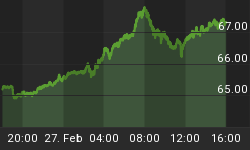Pretend, for a moment, that you're a money manager in today's manipulated world. You understand that most of what's happening is the result of governments and central banks intervening behind the scenes to force down interest rates and pump up asset prices. You don't trust this process but since "the markets are recovering" you've felt compelled to play along, putting your clients into a standard mix of stocks, bonds and cash.
But you're not feeling the love. With stocks outperforming bonds and cash, your blended portfolios have failed to match the S&P 500 and your clients are asking snarky questions like "What exactly am I paying you for when I could do better by just buying an ETF?"
So finally, as equity prices march ever higher and governments around the world reiterate their promises of unlimited cheap money from here to eternity, you throw up your hands and give the clients what they want, loading up on growth stocks, especially those in the hottest emerging markets.
Then, out of the blue, the dollar spikes, oil tanks and the world tips into chaos. US stocks have their worst week in three years, emerging markets collapse, and clients who last month demanded double-digit gains now start begging for reassurance that their savings won't just melt away.
You, of course, have no idea what to tell them. You've never really had any idea what was going on because the stuff you learned in business school was all about markets and cash flows and how to analyze them. Today there are no markets. Instead of millions of more-or-less rational, self-interested producers and consumers, all you see when you look out the window is a handful of large, politically-motivated entities playing games with make-believe currency to get through the next election cycle or bonus period. Fundamentals like P/E ratios and dividend yields offer no insight into what might happen, and traditional asset allocation formulas, based as they are on the assumption of free capital flows and rational actors, give results that are random at best and exactly the opposite of what was intended at worst.
And this is just the first month in what might -- if oil keeps falling and energy-company junk bonds blow up and the eurozone falls back into recession and Greece, Italy, Spain, and France elect anti-euro leaders and emerging market governments start defaulting and some other less obvious black swans all land at once -- turn out to be 2008 all over again. You barely made it to 2010 with your career and sanity intact, and now here you are again, staring into the abyss and hoping the abyss doesn't stare back.
OR, some central bank talking head might appear on TV with a promise of unlimited cheap money for every imprudent bank and insane oil driller, and the markets might turn right back around and resume their march into fantasy land. So here you sit on a Sunday morning wondering whether to sell everything and move your clients into 100% cash -- as you wish you had when the housing bubble started to burst in 2007 -- or load up on high-beta growth stocks, trusting the Fed, ECB, and BoJ to pay off on the Greenspan put one more time.
The killer is that whatever you do, it's strictly a guess. Financial fundamentals don't matter, geopolitics doesn't matter, and those cook-book financial planning guidelines are irrelevant. You're flying blind with the fate of dozens of people in your hands, people who trust you and have no idea how little you know.
Sometime in the next 24 hours you're going to simply roll the dice with their futures. There, must, you think, be an easier, more honest way to make a living.















